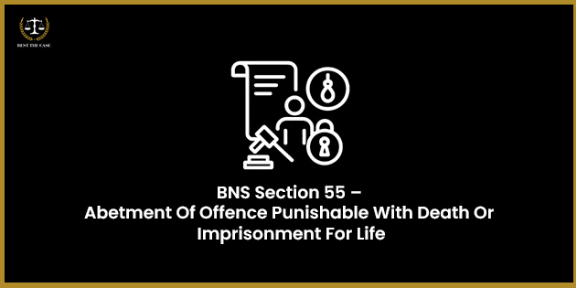BNS
BNS Section 55 – Abetment Of Offence Punishable With Death Or Imprisonment For Life

Section 55 of the Bharatiya Nyaya Sanhita (BNS) makes it clear that anyone who encourages or helps another person to commit a very serious crime, such as murder or terrorism, can be punished even if the crime itself does not happen. The law aims to hold people responsible for their role in planning or supporting grave offences, so they cannot escape punishment just because the crime was not completed.
Legal Provision from the Bare Act (Section 55 BNS)
If someone encourages or helps in committing a crime punishable by death or life imprisonment, but the crime itself does not happen, and if there is no other specific law about punishing this encouraging act, then that person can be punished with imprisonment for up to seven years and fined.
If the act encouraged causes harm or injury to someone, the punishment can extend up to fourteen years of imprisonment and a fine.
Simple Explanation
This section punishes a person who supports or instigates another to commit a serious crime, even if the crime is not ultimately carried out. For example, if you encourage someone to commit a murder but the murder doesn’t happen, you can still be punished. The punishment is generally imprisonment for up to seven years and a fine. However, if someone gets hurt in the process of committing the crime, the punishment can increase to up to fourteen years in prison, along with a fine. The law ensures that anyone who plays a part in urging or helping to carry out serious crimes cannot avoid punishment just because the crime did not happen or was stopped. Even if the person who encouraged the crime was not physically present when the crime was attempted, they can still be held responsible under this section.
Practical Examples Explaining BNS Section 55 in Simple Words
- Imagine ‘A’ tells ‘B’ to kill someone. Even if ‘B’ never goes through with it or the crime doesn’t happen, ‘A’ can still be punished for encouraging such a serious crime.
- Suppose ‘A’ provides weapons to ‘B’ knowing that ‘B’ wants to carry out a dangerous attack. Even if the attack is stopped before it happens, ‘A’ is responsible for helping and can face legal consequences.
- If ‘A’ and some friends plan to attack a place, but the police catch them before anything happens, all involved can be punished for planning and encouraging a serious crime.
- Think of ‘A’ advising someone to poison a person. If the poisoning attempt fails, ‘A’ still faces punishment because encouraging a crime is itself a crime under this law.
These examples show that helping or encouraging someone to commit very serious crimes is punishable, whether or not the actual crime takes place. The law wants to stop bad actions early by holding encouragers responsible.
Important Highlights and Differences
Point | Earlier Law (IPC 115) | BNS Section 55 |
|---|---|---|
Crimes Covered | Serious crimes are punishable by death or life imprisonment | Same |
Punishment for Crime Not Done | Up to 7 years jail + fine | Same |
If Injury Happens | Up to 14 years jail + fine | Same |
Who is Punished | Those who help, instigate, or advise | Same |
Conclusion
BNS Section 55 is a vital legal provision that punishes abetment of serious crimes such as murder, terrorism, and other offences punishable by death or life imprisonment. This section ensures that anyone who encourages, supports, or plans such crimes faces strict punishments, even if the crime is not committed. Understanding the importance of BNS Section 55 helps individuals and legal professionals recognize the consequences of abetment under Indian criminal law. With its focus on preventing serious offences, this section serves as a key tool in maintaining public safety and enforcing justice. For anyone searching about “abetment under BNS,” “punishment for encouraging crimes,” or “BNS Section 55 legal explanation,” this provision highlights the severity of assisting in grave crimes and the stringent penalties involved.
Frequently Asked Questions
Q1. Who can be punished under this section?
Anyone who encourages, advises, or helps someone to commit a serious crime is punishable by death or life imprisonment.
Q2. What if the crime is not committed?
Even if the crime doesn’t happen, the person who encouraged it can be punished.
Q3. Does the abettor need to be present during the crime?
No, they can be punished even if they are not physically there.
Q4. What if someone gets hurt but not killed because of the crime I abetted?
The punishment for you gets stricter if the act you encouraged causes injury or hurt, even if it doesn't lead to death.
Q5. Can the punishment be less if I stop the crime from happening after encouraging it?
If you actively stop the crime before it happens, courts may consider it to reduce the punishment, but simply feeling sorry after the fact is not enough.






